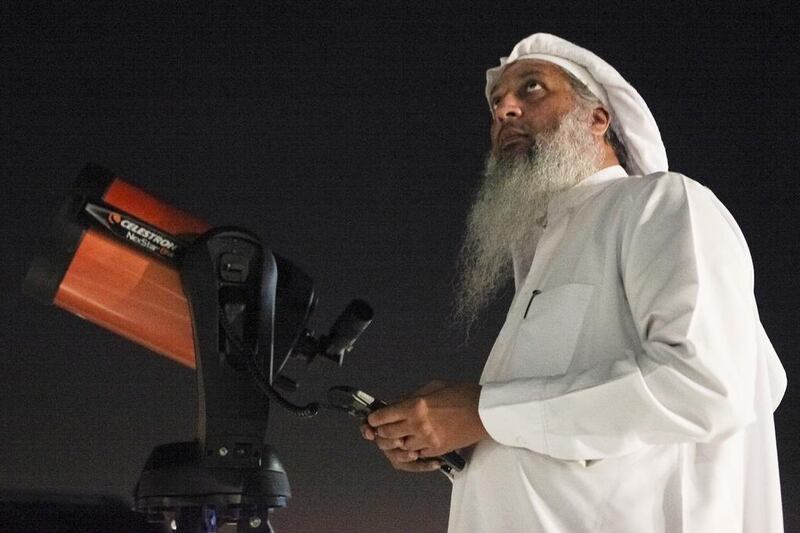Dubai is known for its bright lights - and that is precisely the problem.
Even 50 kilometres south of the emirate, the night is lit by landscaped gardens, construction cranes and streetlights that criss-cross the desert.
Astronomers need darkness but this is getting harder to find. So when the Dubai Astronomy Group’s invitation to a Perseids meteor shower viewing at an “undisclosed location” came through for last Saturday it was unclear what we would see.
These days, dark spots are so rare they are kept secret. At the meeting point on the D63 highway, the chatter was split between the first-timers and regulars.
“You guys have coordinates for where we are going to? Like in case someone gets lost or someone has a Mazda?”
“We are waiting for some fireballs, that’s what we are waiting for.”
“Oh, I had a huge lamp. I forget it.”
“The idea is that there’s no light.”
One man with a 4x4 tells me he wants to stargaze more often, but refuses to go to the desert alone. “It’s very dangerous by yourself, always you should be two or three.”
I nod in agreement. That’s common sense.
“There’s black magic in the desert,” he says.
“And anyway, it’s not clever to go to the desert by yourself,” I say.
“The black magic is real.”
People gather around Hasan Al Hariri, an Emirati with a flowing white bead who will spend much of the evening walking around in a white robe, pointing a laser at the stars.
Al Hariri is the chief executive of the Dubai Astronomy Group. A childhood interest in space and mathematics led to a career with Etisalat, but his manner is more like that of a headmaster.
The previous night, about 500 people visited the Thuraya Astronomy Centre in Mushrif Park for a meteor viewing and introductory talk. It was a far better turnout than expected and Al Hariri actively discouraged people from attending the desert event the following night. To keep numbers small, he reminded them of the seasonal humidity and a three-quarter full moon that would lessen the visibility.
"How many people are here, 35?" he asks, looking around. As we wait to set off he talks of constellations. "All of this has a practical application, and that is what I really love," he says.
__________________
Read More:
Perseid meteor shower to light up UAE Desert Skies this weekend
My UAE: Getting starry eyed with Hasan Al Hariri
__________________
Someone brings up astrology. “That, we are really disputing with these guys,” says Al Hariri, in a friendly tone. “That we condemn. We don’t do hocus pocus. That’s kind of insulting for the astronomer.”
I drive to the site with Mohammed Sharmeen, a gemologist from India and long-term UAE resident. He is a regular stargazer and has come to see the Andromeda Galaxy.
Like many amateur astronomers, he knows the moment he fell in love with space - the launch of the first Indian satellite, Aryabhata, named after the fifth century Indian astronomer. “I was in class six,” he says.
But, astronomy is not for everyone, he cautions. Those who are only interested in the number of stars or their size miss the point.
Astronomy by numbers is a path to boredom, he says. True love stems from curiosity about scientists from our past and the discoveries of our future. “Recent discoveries are there. Like the periodic table. They’ve added to it. There’s always something new. Still we are in the basics.”
When we arrive after a short drive, Al Hariri’s sons and daughters are waiting for us with mats and telescopes. Even here, there are streetlights to the north and every few minutes, the camp is lit up by a passing dune-basher.
Al Hariri invites us all to lay down for the best view of the sky.
“The first thing, I would like to notify you is about this weather, which is hot,” he begins. “This heat that we are experiencing, this is part of the enjoyment. That torture. We will have a breeze in another half-hour. The stars tell us this. But I won’t disclose how at this time.”
Within a few minutes, he has invited everyone to download the Star Chart stargazing app and people are pointing their phones to the south, looking at a connect-the-dots image of the Scorpius constellation.
Meteors however, are few and far between. The moon ascends over the east, first dim and red and then white and great. Hope of seeing the Perseids fades.
“This is unbelievable,” says Al Hariri, still grinning. “We are between the sun and the moon. We are inside a torch right now.”
Behind me, two men are deep in a discussion about whether it is possible to see God.
Here in the darkness, we find light in the universe.





